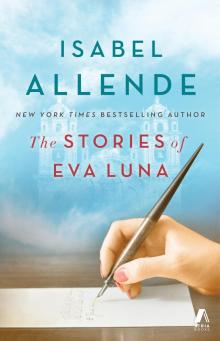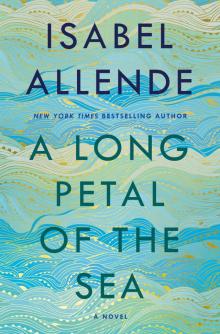- Home
- Isabel Allende
City of the Beasts Page 3
City of the Beasts Read online
Page 3
The harsh neon signs and car headlights made the wet, dirty streets look unreal. There were mounds of black plastic bags on the street corners, some torn, with garbage spilling out. A beggar wrapped in a ragged overcoat was poking through the bags with a stick as she muttered some endless litany in an invented language. Alex had to jump aside to avoid stepping on a rat with a bloody, bitten tail; it had planted itself in the middle of the sidewalk and refused to move as the people went by. Horns, police sirens, and the occasional wail of an ambulance filled the air. A very tall and ungainly young man went past shouting that the world was coming to an end; he thrust a wrinkled sheet of paper into their hands that featured a half-naked, pouty-lipped blonde advertising massages. Someone on skates, with a Walkman plugged in his ears, ran into Alex, slamming him against a wall. “Look where you’re going, moron!” the aggressor shouted.
Alex could feel the wound in his hand beginning to throb again. He felt as if he were trapped in a sci-fi nightmare, in a terrifying megalopolis of cement, steel, glass, pollution, and loneliness. A wave of nostalgia washed over him for the town beside the sea where he had spent his lifetime. That tranquil, boring place he had so often wanted to escape from now looked wonderful. Morgana interrupted his mournful musings.
“I’m starving. Could we get a bite to eat?” she asked.
Alex tried to excuse himself. “It’s really late, I need to get to my grandmother’s.”
“Chill, man. I’m going to get you to your grandmother’s. We’re almost there, but it would do us good to get something in our stomachs,” she insisted.
Without giving him a chance to protest, she dragged him by the arm into a noisy hole-in-the-wall that reeked of beer, rancid coffee, and fried food. Behind a long Formica counter, a couple of Asian waiters were handing out plates of greasy noodles. Morgana climbed onto a stool at the counter and studied the chalkboard menu on the wall. Alex realized that he was going to have to pay for the meal, so he went to the men’s room to get out the money he had hidden in his boots.
The walls of the rest room were covered with four-letter words and obscene drawings. There were crumpled paper towels on the floor and puddles of water that had dripped from the rusted pipes. He went into a stall, shot the bolt, set his backpack on the floor, and, overcoming his distaste, sat on the toilet to take off his boots, a task that was none too easy with a bandaged hand in that cramped space. He thought about germs, and all the diseases his father had told him he could contract in a public rest room. And he had to watch what he spent.
He counted his money with a sigh. He wouldn’t order anything, and he hoped Morgana would be happy with something that didn’t cost very much; she didn’t look like she ate a lot. Until he was safe in Kate’s apartment, those three folded and refolded bills were all the money he had in the world; they represented the difference between salvation and dying of hunger and cold, in the street, like the beggars he’d seen a few minutes before. If he couldn’t find his grandmother’s address, he could always go back to the airport, curl up in a corner for the night, and fly back home the next day—at least he had a return ticket. He put his boots back on, stuck the money in a compartment in his pack, and left the stall. There was no one else in the bathroom. As he passed the washbasin, he set his backpack on the floor, adjusted the bandage on his left hand, and meticulously washed his right hand with soap. He splashed enough water on his face to pep him up a little, and then dried it with a paper towel. As he bent down to pick up his backpack, he realized with horror that it was gone.
He ran out of the men’s room like a shot, his heart galloping. The theft had happened in less than a minute, the thief could not be far; if he hurried, he might catch him before he lost him in the crowded street. Nothing had changed in the restaurant: the same sweating employees behind the counter, the same indifferent customers, the same greasy food, the same sounds of dishes and rock music at full volume. No one noticed his alarm, no one turned to look when he yelled that he had been robbed. The only difference was that Morgana was not at the counter where he had left her. There was no trace of her.
Alex guessed in an instant who had quietly followed him, who had waited just outside the door, calculating her opportunity, who had grabbed his backpack in the blink of an eye. He clapped a hand to his forehead. How could he have been so naive! Morgana had foxed him as easily as if he were a two-year-old, making off with everything he had except the clothes on his back. He had lost his money, his return plane ticket, even his precious flute. The only thing he had left was his passport, which by chance he had put in his jacket pocket. It took all his strength not to bawl like a baby.
CHAPTER THREE
The Abominable Jungleman
KATE LIKED TO say, “Where there’s a will, there’s a way.” Her work obliged her to travel to remote places where she surely had put that saying into practice many times. Alex was rather shy; it was hard for him to go up to a stranger to ask anything, but there was no other way. As soon as he had calmed down a little and could talk, he went over to a man chewing a hamburger and asked him how to get to Fourteenth Street and Second Avenue. The man shrugged his shoulders without answering. Feeling insulted, Alex could tell he was turning red. He hesitated a few minutes but finally went up to one of the waiters behind the counter. The man pointed his carving knife in some vague direction, and shouted instructions over the roar in the restaurant, in an accent so thick that Alex didn’t understand a word. He decided to use logic: he needed to find out what direction Second Avenue was and then count the streets. Simple. But it didn’t seem quite so simple when he found out that he was on Forty-Second Street at Eighth Avenue and figured how far he had to go in that icy cold. He was grateful for his training in mountain climbing; if he could rock climb for six hours, like a fly, he could certainly walk a few blocks on level ground. He zipped up his jacket, tucked his head down between his shoulders, put his hands in his pockets, and started walking.
It was after midnight and beginning to snow when Alex reached the street his grandmother lived on. The neighborhood looked run-down, dirty, and ugly; there wasn’t a tree in sight and it had been some time since he had seen a human being. He thought only someone as desperate as he was would be walking through the dangerous streets of New York City at that hour. The only thing that had saved him from being mugged was that no criminal in his right mind would want to be out in this cold. His grandmother’s building was a gray tower in the middle of many other identical towers surrounded by security fences. He rang the bell and immediately the harsh, hoarse voice of Kate answered, asking who it was who had the nerve to bother her at that hour of the night. Alex could tell she had been waiting for him, although of course she would never admit it. He was frozen through and through, and never in his life had he needed so much to throw himself into someone’s arms, but when the elevator door finally opened onto the eleventh floor and he was standing before his grandmother, he was determined not to let her see his weakness.
“Hello, Grandmother,” he said as clearly as he could, given the way his teeth were chattering.
“I’ve told you not to call me Grandmother!” she scolded.
“Hi, Kate.”
“You took your time getting here, Alexander.”
“I thought we agreed that you were going to pick me up at the airport,” he replied, struggling to hold back the tears.
“We didn’t agree to anything. If you’re not capable of getting from the airport to my house, you certainly aren’t capable of going into the jungle with me,” said Kate. “Take off your jacket and boots. I’ll give you a cup of hot chocolate and draw a warm bath for you, but you can be sure I’m doing it only to keep you from getting pneumonia. You have to be healthy for the trip. Don’t expect me to pamper you in the future. Understand?”
“I have never expected you to pamper me,” Alex replied.
“What did you do to your hand?” Kate asked when she saw the soaked bandage.
“That’s a long story.”
Kate’s small apartment was dark, crowded, and chaotic. Two windows—the panes were filthy—looked out on a light shaft, and a third faced a brick wall and a fire escape. He saw suitcases, knapsacks, bundles, and boxes in all the corners. Books, newspapers, and magazines were piled on tables. There were human skulls she had brought from Tibet, bows and arrows from African pygmies, funeral vessels from the Atacama Desert, petrified scarabs from Egypt, and a thousand other objects. A long snakeskin stretched the length of one wall. It had belonged to the famous python that had swallowed Kate’s camera in Malaysia.
Until that moment, Alex had never seen his grandmother in her own surroundings, and he had to admit that now, seeing her among her things, she was much more interesting. Kate was sixty-four years old, thin and muscular—pure fiber, and skin like leather from spending so much time outdoors. Her blue eyes, which had seen a lot of the world, were as sharp as daggers’ points. Her gray hair, which she herself cut without looking in the mirror, stood out in every direction, as if it had never been combed. She was proud of her teeth, large and strong enough to crack walnuts and pop bottle caps. She was also proud that she had never broken a bone, never seen a doctor, and had survived everything from malaria to scorpion bites. She drank straight vodka and smoked black tobacco in a sailor’s pipe. Winter and summer she wore the same baggy trousers and a sleeveless jacket covered with pockets in which she carried everything she needed to survive in case of a disaster. On the rare occasions when she needed to get dressed up, she took off the vest and put on a necklace of bear’s teeth, the gift of an Apache chieftain.
Lisa, Alex’s mother, was afraid of Kate, but the children eagerly awaited her visits. This outlandish grandmother, the protagonist of incredible adventures, brought them word of places so exotic it was hard to imagine them. The three grandchildren collected the stories of her journeys that had been published in various magazines and newspapers, and the postcards and photographs she sent them from the four corners of the globe. Although her grandchildren were sometimes embarrassed to introduce her to their friends, deep down they were proud that a member of their family was almost a celebrity.
A half hour later, Alex had warmed up with his hot bath and, swaddled in a bathrobe and wool socks, was devouring meatballs and mashed potatoes, one of the few things he liked to eat and the only thing Kate knew how to cook. “These are leftovers from yesterday,” she said, but Alex suspected she had prepared them especially for him. He did not want to tell about his adventure with Morgana and look like a yokel, but he had to admit that everything he had brought with him had been stolen.
“I suppose you’re going to tell me to learn not to trust anyone,” he mumbled, blushing.
“On the contrary, I was going to tell you to learn to trust yourself. You see, Alexander, in spite of everything, you got here to my apartment without problems.”
“Without problems? I almost froze to death on the way. They could have discovered my corpse in the spring thaw,” he replied.
“‘A journey of a thousand miles begins with a single step.’ What about your passport?” Kate inquired.
“It’s safe because I had it in my pocket.”
“Tape it to your chest with adhesive, because if you lose that, you’ve had it.”
“What I hate most is that I lost my flute,” Alex commented.
“Well, I will have to give you your grandfather’s flute. I meant to keep it until you showed some talent, but I suppose it’s better in your hands than just lying around here.”
She searched through the shelves that covered the walls of her apartment from floor to ceiling, and handed him a case covered with thick black dust.
“Here, Alexander. Your grandfather played this for forty years. Take care of it.”
The case held the flute of Joseph Cold, “the most celebrated flutist of the century,” as the critics had written when he died. “It would have been better if they’d said that while poor Joseph was alive,” was Kate’s comment when she read the notices in the newspaper. They had been divorced for thirty years, but in his will Joseph left half of everything he had to his ex-wife, including his best flute, which his grandson now held in his hands. Alex opened the worn leather case with reverence, and stroked the flute; it was beautiful. He picked it up and delicately placed it to his lips. When he blew, the notes escaped from the instrument with such beauty that he himself was surprised. It sounded very different from the flute Morgana had stolen from him.
• • •
Kate gave her grandson time to inspect the instrument and to thank her profusely, as she expected, then handed him a big yellow book with a loose binding: Health Tips for the Adventurous Traveler. Alex opened it at random and read the symptoms of a deadly illness acquired by eating the brain of one’s ancestors.
“I don’t eat organ meats,” he said.
“You never know what people put in meatballs,” was his grandmother’s response.
Startled, Alex looked suspiciously at the last bites on his plate. With Kate, you had to be very cautious. It was dangerous having an ancestor like her.
“Tomorrow you will have to be vaccinated against half a dozen tropical diseases. Let me see that hand; you can’t travel with an infection.”
She examined it roughly, decided that her son John had done a good job, poured half a bottle of disinfectant over the wound—just in case—and announced that tomorrow she herself would remove the stitches. It was easy, she said, anyone could do it. Alex shuddered. His grandmother was nearsighted and used scratched glasses she’d bought secondhand in a market in Guatemala. While she put on a new bandage, Kate explained that the International Geographic had financed an expedition to the heart of the Amazon jungle, on the border between Brazil and Venezuela, to look for a gigantic, possibly humanoid, creature that had been seen a number of times in that area. Enormous tracks had been found, and people who had sighted it said that this animal—or primitive human being—was taller than a bear, had very long arms, and was covered with black hair—like the Yeti of the Himalayas, except that this one lived in the middle of the jungle.
“Maybe it’s a monkey—” Alex suggested.
“Did it occur to you that someone might have thought of that possibility?” his grandmother said, cutting him off.
“But they don’t have proof that it actually exists,” Alex ventured.
“We don’t have a birth certificate for the Beast, Alexander. Oh. An important detail. They say it leaves an odor so strong that animals and people in the vicinity faint or are paralyzed.”
“If people faint, then no one’s seen it.”
“Exactly, but by its tracks they know it walks on two feet. And doesn’t wear shoes, in case that’s your next question.”
“No, Kate. My next question is whether it wears a hat!” her grandson exploded.
“I don’t think so.”
“Is it dangerous?”
“No, Alexander. It’s extremely mellow. It doesn’t steal, doesn’t kidnap children, and never destroys private property. It just kills. And kills cleanly, without any noise. It breaks the bones of its victims, and then guts them with true elegance, like a professional,” his grandmother joked.
“How many people has it killed?” Alex inquired, feeling more and more uneasy.
“Not many, when you take into account how over-populated the world is.”
“How many, Kate!”
“Several gold prospectors, a couple of soldiers, a salesman here and there. The exact number isn’t known.”
“Has it killed any Indians? How many?” Alex persisted.
“They don’t know, really. The Indians don’t count past two. Besides, to them death is relative. If they thought someone had stolen their soul, or walked over their tracks, or taken control of their dreams, for example, that would be worse than being dead. Someone who is dead, however, can go on living in spirit.”
“That’s complicated,” said Alexander, who did not believe in spirits.
“Whoever told you lif
e is simple?”
Kate explained that the expedition was being led by a famous anthropologist, Professor Ludovic Leblanc, who had spent years investigating the trail of the so-called Yeti, or Abominable Snowman, on the border between China and Tibet, without finding him. He had also worked among a tribe of Indians in the Amazon, and made the claim that they were the most savage on the planet; when least expected, they ate their prisoners. This information was not soothing, Kate admitted. Their guide would be a Brazilian by the name of César Santos, who had spent his life in that region and had good relations with the Indians. He owned an airplane that was pretty beat up but still operating, and he planned to use it to fly them into Indian territory.
“In school we studied the Amazon in an ecology class,” commented Alex, whose eyes were getting very heavy.
“Well! No doubt that one class will suffice!” Kate said sarcastically. And added, “I suppose you’re tired. You can sleep on the sofa and tomorrow, early, start working for me.”
“What do I have to do?”
“Whatever I tell you. For right now, I’m telling you to go to bed.”
“Good night, Kate,” murmured Alex, curling up on the sofa cushions.
“Bah!” his grandmother grumbled. But she waited until he fell asleep and then pulled a couple of blankets over him.
CHAPTER FOUR
The Amazon River
KATE AND ALEXANDER WERE flying across northern Brazil in a commercial airplane. For hours and hours, they had been seeing an endless expanse of forest, all the same intense green, cut through by rivers like shining serpents. The most formidable of all was the color of coffee with cream.

 The Stories of Eva Luna
The Stories of Eva Luna The House of the Spirits
The House of the Spirits Paula
Paula Ines of My Soul
Ines of My Soul Of Love and Shadows
Of Love and Shadows Kingdom of the Golden Dragon
Kingdom of the Golden Dragon Daughter of Fortune
Daughter of Fortune City of the Beasts
City of the Beasts Maya's Notebook
Maya's Notebook Eva Luna
Eva Luna Zorro
Zorro In the Midst of Winter
In the Midst of Winter Forest of the Pygmies
Forest of the Pygmies My Invented Country: A Nostalgic Journey Through Chile
My Invented Country: A Nostalgic Journey Through Chile The Japanese Lover
The Japanese Lover Portrait in Sepia
Portrait in Sepia Island Beneath the Sea
Island Beneath the Sea The Soul of a Woman
The Soul of a Woman A Long Petal of the Sea
A Long Petal of the Sea Ines of My Soul: A Novel
Ines of My Soul: A Novel The Sum of Our Days
The Sum of Our Days